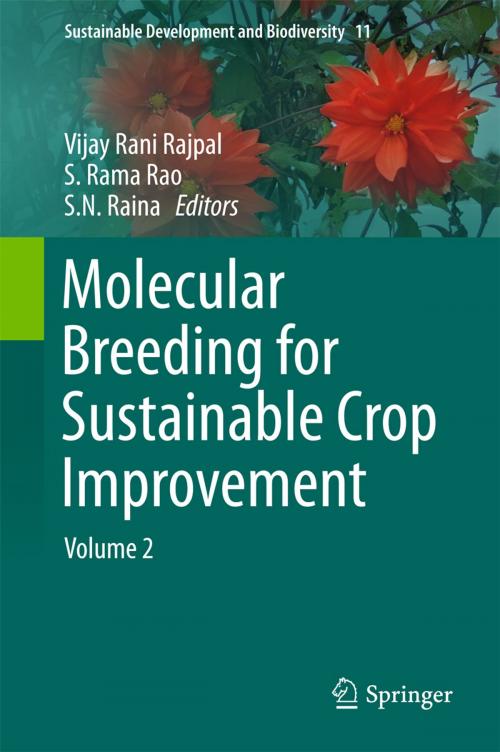Molecular Breeding for Sustainable Crop Improvement
Volume 2
Nonfiction, Science & Nature, Science, Biological Sciences, Botany, Ecology, Nature| Author: | ISBN: | 9783319270906 | |
| Publisher: | Springer International Publishing | Publication: | February 2, 2016 |
| Imprint: | Springer | Language: | English |
| Author: | |
| ISBN: | 9783319270906 |
| Publisher: | Springer International Publishing |
| Publication: | February 2, 2016 |
| Imprint: | Springer |
| Language: | English |
The world population is estimated to reach to more than 10 billion by the year 2050. These projections pose a challenging situation for the agricultural scientists to increase crops productivity to meet the growing food demands. The unavailability and/or inaccessibility to appropriate gene pools with desired traits required to carry out genetic improvement of various crop species make this task formidable for the plant breeders. Incidentally, most of the desired genes reside in the wild genetic relatives of the crop species. Therefore, exploration and characterization of wild genetic resources of important crop species is vital for the efficient utilization of these gene pools for sustainable genetic improvements to assure food security. Further, understanding the myriad complexities of genic and genomic interactions among species, more particularly of wild relatives of crop species and/or phylogenetically distant germplasm, can provide the necessary inputs to increase the effectiveness of genetic improvement through traditional and/or genetic engineering methods. This book provides comprehensive and latest insights on the evolutionary genesis of diversity, access and its utilization in the evolution of various crop species. A comprehensive account of various crops, origin, exploitation of the primary, secondary and tertiary gene pools through breeding, biosystematical, cytogenetical and molecular phylogenetical relationships, and genetic enhancement through biotechnological interventions among others have been provided as the necessary underpinnings to consolidate information on the effective and sustainable utilization of the related genetic resources. The book stresses upon the importance of wild germplasm exploration, characterization and exploitation in the assimilation of important crop species. The book is especially intended for students and scientists working on the genetic improvement of crop species. Plant Breeders, Geneticists, Taxonomists, Molecular Biologists and Plant Biotechnologists working on crop species are going to find this book very useful.
The world population is estimated to reach to more than 10 billion by the year 2050. These projections pose a challenging situation for the agricultural scientists to increase crops productivity to meet the growing food demands. The unavailability and/or inaccessibility to appropriate gene pools with desired traits required to carry out genetic improvement of various crop species make this task formidable for the plant breeders. Incidentally, most of the desired genes reside in the wild genetic relatives of the crop species. Therefore, exploration and characterization of wild genetic resources of important crop species is vital for the efficient utilization of these gene pools for sustainable genetic improvements to assure food security. Further, understanding the myriad complexities of genic and genomic interactions among species, more particularly of wild relatives of crop species and/or phylogenetically distant germplasm, can provide the necessary inputs to increase the effectiveness of genetic improvement through traditional and/or genetic engineering methods. This book provides comprehensive and latest insights on the evolutionary genesis of diversity, access and its utilization in the evolution of various crop species. A comprehensive account of various crops, origin, exploitation of the primary, secondary and tertiary gene pools through breeding, biosystematical, cytogenetical and molecular phylogenetical relationships, and genetic enhancement through biotechnological interventions among others have been provided as the necessary underpinnings to consolidate information on the effective and sustainable utilization of the related genetic resources. The book stresses upon the importance of wild germplasm exploration, characterization and exploitation in the assimilation of important crop species. The book is especially intended for students and scientists working on the genetic improvement of crop species. Plant Breeders, Geneticists, Taxonomists, Molecular Biologists and Plant Biotechnologists working on crop species are going to find this book very useful.















